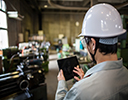 |
| ArtificiaI Intelligence – Human and Machine in perfect Harmony |
| Artificial intelligence is set to transform the insurance industry, but it’s the human factor that will make the ultimate difference, writes Ashley Hirst, Senior Science Business Partner Commercial at AIG. Artificial intelligence (AI) has progressed hugely in recent years bringing machine capabilities in some areas to human-like levels, sometimes at astonishing speeds. In the insurance industry, we understand that AI can add value in areas including risk assessment, pricing, distribution and reserving. |
| But we have more to understand in terms of the importance of people in maximising the power of AI. A fascinating result in the world of chess demonstrated a powerful truth: a computer on its own was no match for a computer teamed with a person. Put simply, human plus machine beats machine. Investing in the Technology of People Our industry has relied on the technical skills of actuaries - and their human insight and judgement. They have honed a powerful toolkit to recognise patterns in pools of aggregated data, and extrapolate into the future. Now, the new wave of advances in machine learning methodologies, coupled with ever more powerful hardware, are enabling computers to identify ever more complex patterns in data. Data scientists are deploying increasingly sophisticated methods and algorithms – ‘teaching’ computers to identify patterns that might involve dozens or hundreds of variables. Predictions can be made at the client, policy or even exposure level, creating enormous segmentation power. Machines’ ‘learning’ patterns can then extrapolate into new situations – and through on-going success or failure, continually learn and improve. We might imagine that this clinical, detached ability to consider reams of data and dispassionately learn from success and failure alike would eventually render human talent redundant. In practice, however, we know that the best results come from harnessing the experience and intuitive insight of a human expert alongside the ‘black box’ machine. We build on expert hypotheses, and test outcomes with human oversight and judgment. In our complex world, too difficult to be perfectly described in a stream of computer bits, the human can consider inputs that the computer might never have a means of interpreting. To be successful, we will have to invest in the capabilities of our people. Our people will need insight into how computer models work, and where their strengths and weaknesses are. The human / machine team will let us play to the human strengths of inter-personal insight and imagination; and address the human weaknesses of noise and bias. A ‘more human’ Experience ‘Chatbots’ – simulating natural conversations with users – are a fast-developing capability today. We should expect to see virtual advisors becoming an ever-present, continually available part of our personal and professional lives. For insurers, these should let us drive down the cost of delivering common services – and let us afford to maintain a personal, human, service for the times of complexity where people are needed; or for those critical moments where a human touch is so important in our industry. We can learn from retail banking; clients prefer an automated experience for the overwhelming majority of routine transactions – but prefer a human for many key moments of truth. At AIG, we are excited that AI and machine learning can help us address our clients’ fundamental issues and risk exposures. In one example last year, we worked with a US university to monitor traffic at intersections for vehicle ‘near misses’. Computers were able to digest and analyse a huge quantity of data and identify patterns that humans could not, with the aim of being able to intervene and make changes to enhance road safety before tragic accidents occur. On construction sites, AIG has invested in Human Condition Safety (HCS), an early-stage company matching wearable technology with AI. HCS offers a comprehensive solution to workplace risk, with a platform that enables workers to reduce injuries and employers to improve operational efficiency. For example, HCS’s technology can detect when a worker carries too much weight, makes a “bad bend,” or enters an area that puts them at risk of injury because of environmental conditions or getting too close to dangerous equipment. Looking Forward AI will help us deal with an increasingly complicated world, at an increasingly refined level of detail. The more intelligent we can make machines, the better we can help our clients to reduce their fear of the future. An investment today in ‘deep learning’ will reveal insights and create capabilities we haven’t imagined before. An investment in our people’s ability to harness that technology will realise the benefits for our clients, and our industry alike. For more information, please do not hesitate to get in touch with your local contact person. |
| © 2017 American International Group, Inc. All Rights reserved. |
 |